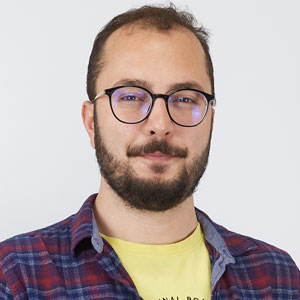Doğuş Duran, MEd

Lecturer/Part-Time Faculty
John Carroll University
Member Since 2021
ACA is a community of diverse, vibrant counselors and educators who are changing lives and the world at large. Among our members is Doğuş Duran, an educator whose work includes organizing conferences for clinicians. He aims to promote counseling’s often-overlooked role in promoting everyday mental strength and resilience.
Briefly describe a typical day in your work life?
As a lecturer and part-time faculty member at John Carroll University, my typical day is dynamic and fulfilling. It involves grading student assignments and meticulously preparing for my classes to ensure a rich learning experience. I collaborate with faculty on research and advocacy projects, focusing on broaching subjects and organizing conferences for clinicians. Amidst these responsibilities, I find time to engage in reading and writing, which are vital for my professional growth and contribution to the field.
What is the biggest challenge facing the mental health field today?
The mental health field today faces significant challenges, primarily due to political shifts at both state and national levels. A major concern is the lack of a unified licensure system in the U.S., which complicates the practice landscape. Additionally, as counseling gains popularity, there's an increased responsibility to be effective gatekeepers to ensure the integrity and quality of the profession. The escalating demand for mental health services, spurred by societal events like the COVID-19 pandemic and global conflicts, adds to these challenges.
What do you think are the biggest misconceptions about counseling?
A common misconception about counseling is that it's a quick fix or a one-size-fits-all solution. Many assume that counseling is only for those with severe mental health issues. It leads to overlooking the profession's value for everyday stresses and personal growth. Another misconception is that counselors give advice, whereas in reality, they empower clients to find their solutions through guided self-exploration. The belief that counseling is a sign of weakness or failure is another significant misunderstanding that overlooks its role in promoting mental strength and resilience.
What role do you think counseling plays in the delivery of mental health services in today's society?
Counseling plays an essential role in mental health services because it acts as a primary source of support and health. It's not just about treatment; counseling offers prevention strategies and helping individuals navigate life's challenges proactively. Counselors enhance life quality by fostering emotional, psychological, and social well-being. They create a space for growth, healing, and understanding. They are crucial in today's fast-paced and often stressful society.
What do you do to take care of yourself and rejuvenate?
To maintain my well-being, I make sure to take at least one day off during the weekend, completely detaching from work-related tasks. This time is dedicated to rejuvenating activities. It is allowing me to return to my duties refreshed and energized.
What outside of counseling brings you joy? Tell us about your hobbies or outside interests.
Outside of my professional life, I find joy in playing the "baglama", a traditional Turkish musical instrument. It's not just a hobby; it's a connection to my cultural roots and a source of creative expression. I also enjoy hiking because it helps me to embrace the tranquility and beauty of nature. Spending quality time with family and friends is another significant aspect of my life. It is providing me with support and happiness. Additionally, traveling offers me new experiences and perspectives because it provides joy and richness to my personal and professional life.
